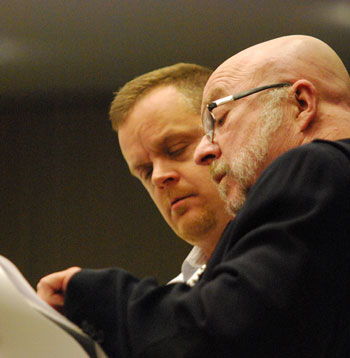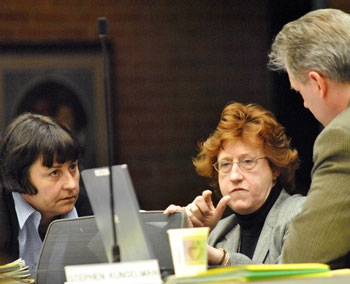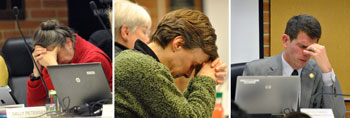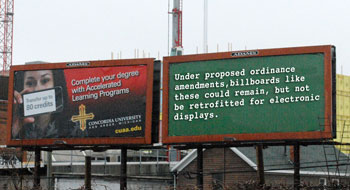Ann Arbor city council meeting (June 17, 2013): Budget items for the 15th District Court drew more attention than any other single topic, taking up more than an hour of the council’s deliberations. The council also devoted more than a half hour to an item related to a Department of Energy grant that could lead to the installation of a wind generator on the property of Pioneer High School.

From left: 15th District Court judge Christopher Easthope – a former Ann Arbor city councilmember – and 15th District Court administrator Keith Zeisloft at the council’s June 17 meeting. (Photos by the writer.)
The main court-related item was part of an annual adjustment to the current fiscal year’s budget (FY 2013), which ends on June 30. The adjustment is made on a routine basis in order to bring the budget in line with actual expenditures. The general fund budget adjustment that was eventually approved by the council increased it by $567,000.
And of that amount, a significant part was attributable to the 15th District Court – including $112,000 in salary increases based on an interest in retaining employees, $203,000 due to a “catch up” payment to the law firm that provides indigent representation, and a back-bill for security from Washtenaw County for two fiscal years for $110,000. None of the salary increases went to judges, whose compensation is set through state statute.
The council was essentially being asked to approve the accounting adjustment for money that had already been spent this year.
The city’s budget for the next fiscal year – approved by the council last month, on May 20, 2013 – already incorporated the court workers’ salary increases going forward, and councilmembers had been apprised of the raises before their budget deliberations in May. The council’s deliberations on May 20 had not focused on those raises, but rather on the possibility of reducing the court’s budget in order to fund additional police officers for the city.
At the June 17 meeting, all three judges of the court plus the court administrator were on hand – as some councilmembers drew out a disagreement regarding how the wage increases should have been approached. At least some councilmembers felt the court should have asked the council before awarding wage increases to its workers.
Tom Crawford, the city’s chief financial officer, indicated at the meeting that if the council had not approved the budget adjustment for the court, it would likely have generated a note in next year’s audit.
Other court-related items on the council’s agenda included a new $240,000 annual flat-fee contract with Nassif and Reiser – the firm that provides indigent representation for the court. The council also approved a $160,000 contract with the Washtenaw County sheriff’s office for weapons screening at the Justice Center, the building next to city hall that houses the 15th District Court.
The council approved two items related to the court’s special Sobriety Court, one of which was a $65,000 grant program contract with the nonprofit Dawn Farm to provide in-patient and out-patient drug abuse counseling to 15th District Court defendants. It was approved over the dissent of Sabra Briere (Ward 1), who objected to the accompanying provision that waived a requirement that Dawn Farm adhere to the city’s living wage ordinance.
The wind generator item was originally on the consent agenda, but was pulled out for separate consideration. The council had previously voted unanimously at its Jan. 7, 2013 meeting to accept a roughly $950,000 U.S. Department of Energy grant for installation of the wind generator. The council was asked on June 17 to spend about $50,000 of the grant proceeds on an initial environmental assessment, required before the project can move forward. Three councilmembers balked at the request, but the resolution was ultimately approved.
In business related to revisions of local laws, the council gave final approval to an ordinance change that limits use of fireworks to between the hours of 8 a.m. and midnight. And the council gave final approval to the city’s outdoor sign ordinance that limits the incorporation of digital technology into outdoor signs – in a way that prohibits such use for billboards. However, the council again delayed taking an initial vote on an ordinance that would regulate how local law enforcement officials can use public surveillance cameras. The council did give initial approval to adopt the new fire code into the city’s ordinances.
In land use and development business, the council approved a revised development agreement for The Varsity. The agreement now incorporates a total of seven monthly parking permits that will be purchased at a premium cost under the city’s contribution in lieu (CIL) program. The council also gave approval to site plans for two projects: the State Street Center and 544 Detroit St. The 544 Detroit St. project included a brownfield plan, which was also approved. Another brownfield plan was on the council’s agenda – related to the Packard Square development on the site of the former Georgetown Mall. That plan had previously been approved, but an additional council vote was needed to change the set of activities that are eligible for reimbursement.
In connection with government-controlled land, the council approved $382,000 in additional operating support for the Ann Arbor Housing Commission. The council also passed a resolution committing up to $750,000 in general fund money to convert city-owned property at 721 N. Main to a greenway park. However, if the grants that the city expects to be awarded are actually received, none of that $750,000 would need to be spent on the project.
The council again heard public commentary about a homelessness outreach ministry in one of the city’s established parks – Liberty Plaza in downtown Ann Arbor, at Division and Liberty streets.
The council also approved revisions to collective bargaining agreements with the six unions in the police department, which gave members a 2% wage increase.
In a symbolic effort, the council voted to oppose expansion of I-94 in Detroit and I-75 in Oakland County – a proposal that’s part of SEMCOG’s 2040 Regional Transportation Plan with an estimated cost of $4 billion. SEMCOG subsequently adopted the plan.
The council put off voting on proposed changes to its internal rules, which could result in adding public commentary time at the council’s work sessions, but reducing the time allowed per turn from three minutes to two minutes. The council is expected to vote on the full set of rule changes at its July 1 meeting.
The proposed changes to the rules would move nominations and confirmation of appointments to a slot near the start of the meeting, instead of its current position near the end. For the June 17 meeting, the council’s confirmations came after midnight – and included reappointment of Bonnie Bona to the planning commission, and LuAnne Bullington to the taxicab board. [Full Story]











